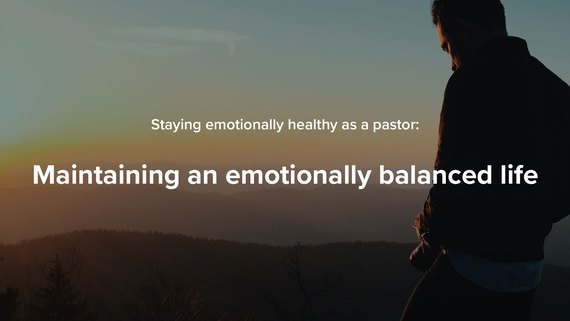This year has been brutal for pastors. It’s been difficult for everybody, but especially for pastors and church leaders.
They’ve had to lead their congregation through massive and sudden change, without warning or a road map. And while they make the best decisions they can, it’s almost guaranteed that no matter what they decide, there will be a handful of leaders in their congregation who will disagree and might even have a little bit of anger and strong emotions.
Pastors are weary. They have decision fatigue, and they’re emotionally exhausted. And some have full-on burnout.
That’s why we started this series of videos geared toward the emotional health of pastors. Each week I’ll interview a pastor or leader to give practical wisdom or guidance.
I am really honored to introduce to you my friend, pastor Paul Hobson of United in Christ Christian Church near Atlanta. I visited his church and worked with him, and Pastor Paul has modeled a sense of humility and emotional health. So I thought he would be great for you guys to meet and learn from.
Bruce Hopler: So, Pastor Paul, first of all, welcome. Thank you for joining us.
Paul Hobson: Thank you, Dr. Bruce. Glad to be here.
BH: Good.
PH: And thank you for asking me to do this. I’m very humbled by that.
BH: Well, awesome. Well, I asked you by watching your journey, so that’s what inspired me to ask you. So I mentioned some of the things about the burnout and the stress and the immense challenges that pastors are going through. Are you seeing that as well during this heightened, even more so during this season?
PH: Absolutely, Dr. Bruce. Being on some of the calls with the organization that we’re a part of, Converge, and specifically for me, Converge Southeast, pastors are at different places. Some, you can hear the anxiety. Others are working through it, being concerned about the members first and foremost, how to maintain their leadership.
It’s just a lot going on, as well as family life and all the other things that are going on, which, pastors are leaders in our community. And so I’m sensing that there is a lot of stress and a lot of questions that are going on right now in our community of pastors.
BH: Yeah, yeah, so what a tough season. It’s obviously an opportunity for the church to be the church and to get out there and to really make a difference, but it is so much decision-fatigue and emotional challenge. So let me ask you, Pastor Paul, let’s just start off with this question. Why would you consider it critical to maintain emotional balance as a pastor?
PH: That’s a great question, Dr. Bruce. I think what comes to mind for me is Jeremiah 3:15. It says, God says that I will give you pastors after my heart and for you to lead them with knowledge and understanding.
We have a tremendous responsibility. People are watching us out of our membership, our congregations, other pastors. They are watching us to see how we handle these things. And so because we have the care of others in our hand, as leaders, it is critical that we maintain that emotional balance so that we can let others know that they too during these tough times can be balanced.
And that’s a key word. You gotta have an even keel, you know. Scripture says to be angry but sin not. And so we can go through these emotions, but we really need to know how to balance these emotions for not only our sake, for not only our family’s sake, but for those who we’ve been charged to lead.
And so once again, I think Jeremiah 3:15 really expresses it. I have given you pastors after my heart to lead and guide the sheep, basically, with knowledge and understanding.
BH: Hmm, now, Pastor Paul, that’s so critical. And you know, I feel like that a lot of times it’s easy as a pastor to fake it, so on the outside to be like, oh yeah, we’re good. I’m in charge. I’m perfect. I got it all, you know, have almost like a godlike complex, like I gotta appear a certain way.
PH: Yes.
BH: And then, inwardly ignoring the cry of the heart, the cry of the soul and inwardly ignoring it, thinking that, well, I’ll get to that later. And you’ll just kind of put that off, put that off, punt that down the field, punt that down the field. Before you realize it, it’s almost too late to do anything about it, you know?
PH: Yes.
BH: So that’s why you’re right. If I’m gonna be healthy for my leaders and my people, I first have to be healthy for myself.
PH: Absolutely. That is so critical.
BH: So let’s get real practical here. What are some things that you can do as a pastor to help kind of keep an emotionally balanced life?
PH: That’s a great question, Dr. Bruce. I think that we have to surround ourselves with people that we can talk to, and that’s not only for us as pastors but for others as well.
I think also that we’ve got to, for me, we’ve gotta have some things that we do otherwise outside of just this, right? What are we doing to take care of our physical bodies? What are we doing outside of just pastoring for ourselves? I play golf, as you know. We played golf together.
BH: I was really bad.
PH: I bike-ride with my wife. I talk to her. Last night, as a matter of fact, one of our members, they have a food truck, and they go to different areas. That’s not their only job. It’s their outside passion. But my wife said to me yesterday, “Why don’t we go take a ride somewhere? And I said, “Yeah, Tony and Monique, they’ve set up over in Kennesaw, Georgia. Let’s ride over to see them.” And we went over and surprised them and bought some barbecue from them.
So we’ve gotta do things outside of just focus on, this is our priority. We have to do things outside to care, self-care for ourselves, physically, spiritually and emotionally. That is so critical. And so we’ve gotta find what that outlet is for us.
BH: Hmm, yeah, that is critical, spending some time just kind of finding your hobbies. And, you know, Pastor Paul, I continue to be surprised how few pastors have friends. Well, even, actually, I’ve had pastors tell me, “Why do I need friends? I got my wife.”
PH: Wow.
BH: “I got my, whatever. I got, you know, things. I got my job. I got my board. I don’t really need close friends.”
And those are the people that scare me the most, you know, ’cause they will have a tendency to just not have a way to kind of process. And I love the physical getting-out. And one of the things, you know, for me, it’s motorcycling. I love to motorcycle.
PH: Yeah.
BH: And you don’t get more social distancing than that, you know? And just kind of go out. But if we’re not finding that time, if we’re not finding that engagement, if we’re not being intentional, Pastor Paul, let me ask you this. Still on this topic of the practical things, what are some of the things you have to do?
’Cause you have all these things that are crying out to you. You know, you gotta figure out how to stream your services better. You’ve gotta figure this out. You’ve got all these learning curves. You got all these problems to solve.
How is it that you allow that to be a higher priority, raise it to a higher priority to make sure, no, stop; I’m gonna spend time with my wife; I’m gonna get out, you know; I’m gonna spend time with a friend, you know, whatever. What are some of the ways that you’ve helped set those boundaries pretty much?
PH: Well, I think, I’m reading this book called the Daily Office, as an example, by Peter Scazzero. And he talks about, you know, having that alone time with God to meditate and to pray. And in order to even do that, we have to say stop. So, during that time of meditation, and I know that we’re talking practical things, but even to be spiritually linked, God will say to me, “Listen, those things will take care of themselves.”
You will take care of yourself because of those very things that you just mentioned. You gotta do that. But guess what, if you don’t empty the trash masher, learned, if we keep suppressing things in our lives, eventually it will explode, and it can explode you. You would hate for it to explode during a sermon, but it can explode in our physical health, in our mental wellbeing.
So I think just really understanding that, listen, I can only do so much at this time. In order for me to recharge, to your point, I’ve got to, we’ve gotta surround ourselves with other friends, people that we trust. I think oftentimes pastors have a heavy challenge with being transparent, with sharing with friends and others really what’s going on with them. I was talking to a pastor friend, and oftentimes it’s not from our membership because they see us as pastor, but also letting them know that, you know, we’re just human beings as well.
And so I just think being able to, you just have to put those boundaries in your life and just stop and say, “I’m going to ride my bikes today.” Now, I’m going to go to the building. I still gotta call these people to make sure. As an example, I met with our media team last week, as a matter of fact, and I said here is the charge. We have to be excellent in this area because we don’t know when we’re coming back into the building, and you pass that responsibility on. You have to trust leadership. And then we have to be able to just really take care of ourselves.
Talk to people, talk to you. I mean, you know, I say utilize what. God has put around pastors all so often, so many people that we can talk to and glean from and engage. I shared with you earlier. And we have the same pastor, Dr. Michael Henderson, and I called him. You call those persons that are there for you that when you’re at this point, let me get their feedback and let me get their. The Scripture teaches us that there is safety in the multitude of counselors, and so I believe that. And yeah, so I think that we just have to take the time to do those things.
BH: That’s awesome. That’s awesome. Well, Pastor Paul, as you know, as Converge, we have districts, we have 11 districts, and they make up groups of churches. And one of the major themes our president has oftentimes said, which I love, is that we’re better together.
PH: Yes.
BH: So whether it’s a fellow Converge church or working with your district or just working with the church across the street, when it comes to coaching and encouraging pastors, how do we help other pastors to maintain an emotionally balanced life?
PH: And you said it right there. I think the first thing that we have to do is let them know that we are available. We have to make ourselves available to hear from them, to be friends with them. I think relationally, that is the key. I’m so thankful for Converge, pastors that have reached out to me, and I’ve reached back out to them, pastors that I’ve met on calls.
They probably have heard some things in me that say, “Hey, let me, let me ask you this.” And I said, “Yeah, I’ve heard some things, and you let me ask you that.”
So making ourselves available to them, to each other, knocking on doors, picking up the phone and letting them know I’m here for you. It’s OK that we can share and talk. And as I said, God has placed, I said earlier he’s placed persons like yourself in my life, persons like Dr. Henderson, persons like Ernie Cabrera on the board, pastors that are not a part of Converge that I know that are in my neighborhood, who I will call just to say hello.
I think we have to get outside of our lonely zone and be engaging. That’s what we, as pastors, need to do. As I said earlier, become more transparent. We have to put ourselves on the line, right. And what I mean by that, we have to open up to each other, share with each other what’s going on in our lives, and then trust the Holy Spirit that, you know, he’s gonna speak and answer to us through others.
I’ll never forget. I’ll never forget, when you came to our church, I still remember this, and I said, “Dr. Bruce.” I said, “Can you look around and just tell me a couple of things that need to be done?” And I’ll never forget this, you said, “Well, one thing, you could brighten up the lines in your parking lot.” I don’t know if you remember that.
BH: Oh, I do.
PH: And I said, it’s just very practical, one practical thing that we could do. So immediately we went out and bought a liner, you know? And so when we hear, going back to your question, when we hear the advice that I believe God speaks through others to us, heed to the counsel.
Just do it, and it will relieve that stress. It was the aha moment. Oh yeah, I never looked at that. So here’s what I can do. So, yeah, I just think making ourselves available, making ourselves available one to another is very key and getting beyond the egos, the pride. We’re not Jesus, right? We only have one Messiah. So God sends other people in our lives to help us. And we have to heed to that help.
BH: You know, Pastor Paul, I bet you most pastors would say, “Oh, we’re not competing with everybody else.” It’s not about a competition, but what they say and how they practically live can be very different.
And to actually say, no, I am going to serve you, pastor down the street, and actually to help and say, “How can I help you to be better during these crazy times?
PH: Yes.
BH: Well, Pastor Paul, I would like to end this way. I would love for you to pray a prayer over the pastors that are listening to this video.
PH: Yes, sir. So, Father, we thank you. We praise you for this time. Lord, we thank you that you don’t repent for calling us even into this awesome position of pastoring, of shepherding, of looking over the lives of others. And, Father, I pray right now for strength. You said that we could look to the hills from which cometh our help. Our help comes from the Lord. You said that we could let this mind be in us, which is also in Christ Jesus. And you told us in your Word that the joy of the Lord is our strength.
Father, I pray right now for all the pastors that may watch this. Lord, I pray for our leaders, even as Dr. Bruce, who you have placed in his heart to do this to help others, that we would just take hold of what you’ve given us, take hold of the other persons that you’ve placed in our lives to help us and that we would be obedient to your Holy Spirit.
Lord, I pray for the health and wellbeing of every pastor, but we don’t take it lightly, the calling that you’ve placed upon us, nor the work that we have to do. Lord give us just a sense of obedience to obey our health, listen to those who love us that are around us, Lord, that we would take time for ourselves and that we will learn how to empty the trash masher, that is to empty those things that are stressing us.
Lord, that we would take hold of new things that would give us peace, a peace that passes all understanding. So I pray for every pastor, God that we will continue to preach and teach your Word and that we will hold onto Jeremiah 3:15. that you, Lord, have given the people of God pastors after your heart, that Lord, we would teach them through knowledge and understanding. This is my prayer even this morning in Jesus’ name, amen.
BH: Amen, thank you, Pastor Paul.
PH: Yes, sir. Thank you, Dr. Bruce. God bless you. Love you, man.
BH: Love you too, man.
If you’re a pastor and you need someone to talk to, contact us.



